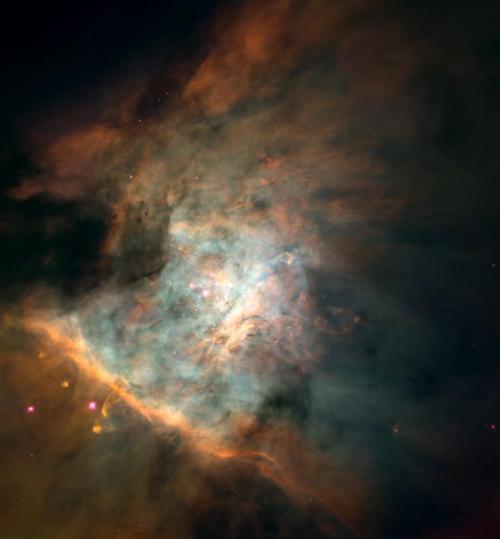
Panoramic Hubble Picture Surveys Star Birth, Proto-Planetary Systems in the Great Orion Nebula
Metamorphosis. We all know what it is every time we look in the mirror.

And we are all familiar with Midas Mufflers, and the Midas Touch. We eat cereal with no thought as to where the word originated, and we think of Pluto, Jupiter, Callisto, Saturn, Mercury et al. as only planets, but have you ever wondered where those names all came from, and what they really mean? We know what an echo is, but do we know who she was?
2000 years ago Ovid wrote an epic poem called The Metamorphoses, about change and transformation. He was the favorite poet of the Renaissance, and influenced Chaucer, Shakespeare, Spenser, Marlowe, and Milton.
When did you last read him? Here's your chance! Why not join us in a bold new experiment in the New Year with something old and something new, (for us) : Ovid's Metamorphoses, Book I? It's available free, online, and can be read in 1/2 hour. We'll compare translations and see which we think is best and enjoy talking about the issues it raises. Come join us!
(The Lombardo translation is highly recommended, but there are tons of them available online, free. Here is a sampling, or please share with us another you've found which you like:)
---http://ovid.lib.virginia.edu/trans/Metamorph.htm#488381088---Translated by A.S. Kline...(This one has its own built in clickable dictionary)...---http://classics.mit.edu /Ovid/metam.html...---Translated by Sir Samuel Garth, John Dryden, et al
---- http://www.theoi.com/Text/OvidMetamorphoses1.html----Translated by Brookes More
Family Tree of the Gods and Goddesses of Greece and Rome:
-------http://www.talesbeyondbelief.com/roman-gods/roman-gods-family-tree.htm
-------http://www.talesbeyondbelief.com/greek-gods-mythology/greek-gods-family-tree.htmWeek One: January 21-? Chaos and Order:Bk I:1-20 The Primal Chaos
Bk I:21-31 Separation of the elements
Bk I:32-51 The earth and sea. The five zones.
Bk I:52-68 The four winds
Bk I:68-88 Humankind
Some things to think about:
1. How is this creation story like and unlike other creation stories?
2. The god that creates the world isn't named, and it's not clear whether mankind was created by a god or the forces of nature. Why do you think it's said this way?
3. What is the shape of the newly created world?
4. Why did Ovid settle on "changes" as the theme of his poem?
5. What do you know about Ovid? What else did he write?
[/list]



